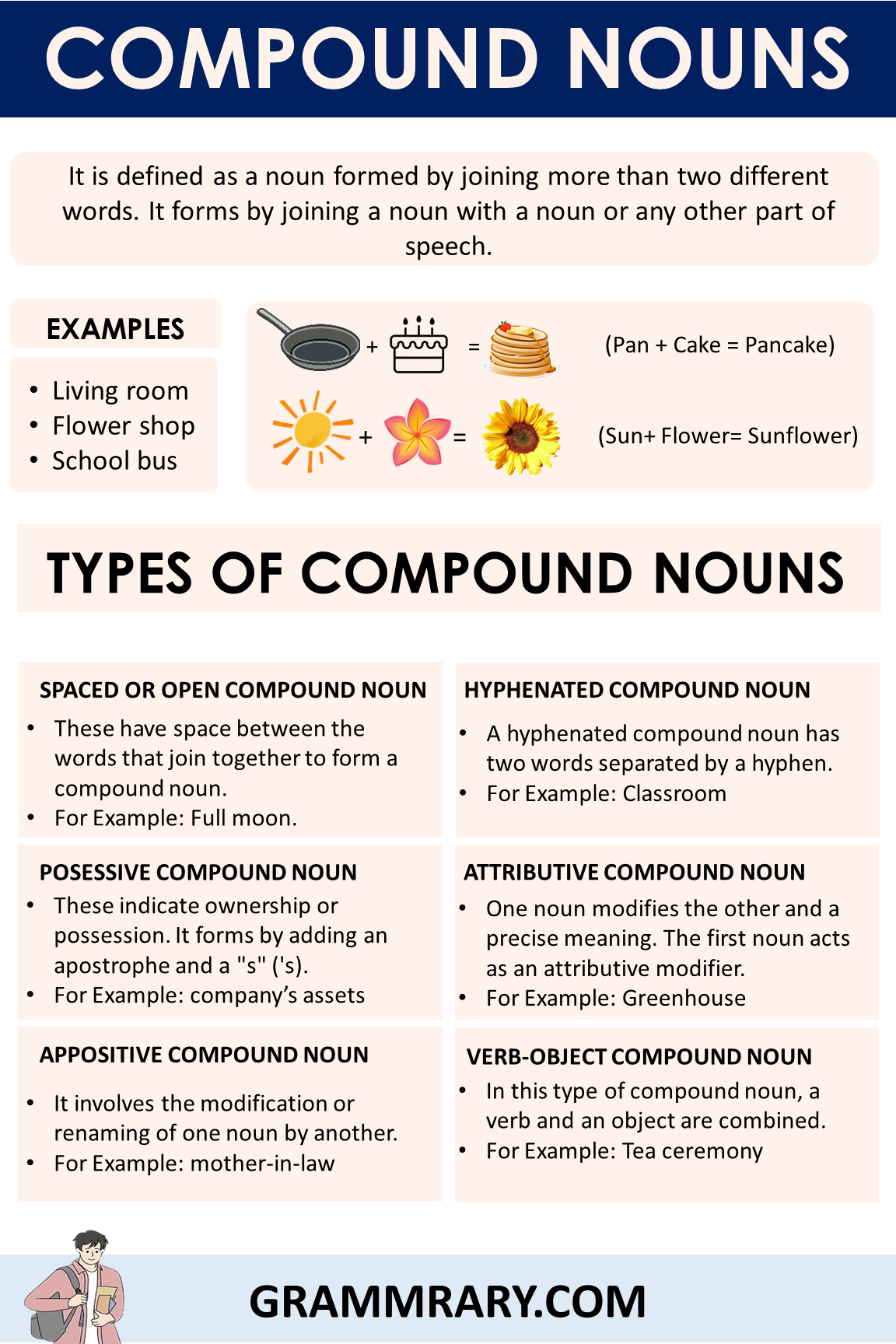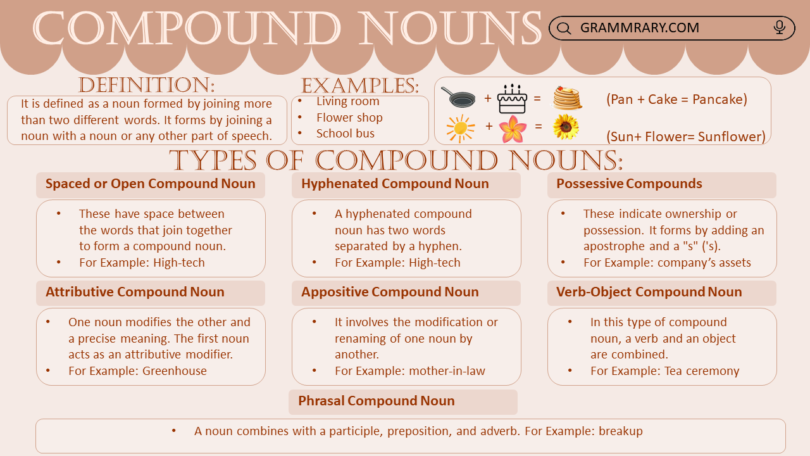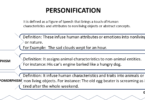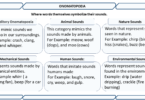Two People together make a Duo. But what about two nouns or a noun with any other part of speech? These are Compound Nouns. These are formed by joining two or more nouns. These play an important role in everyday language. Do you want to see its importance just in our daily life? Classroom, Guestroom, Storeroom, Grandmother, Grandfather, Granddaughter, Grandson, and a lot more.
What Is a Compound Noun?
When a noun combines with another noun or any other parts of speech, it forms Compound noun. Let’s explore the Definition, Examples, and Usage in Sentences, Types, and exercises.
Definition of a Compound Noun
It is defined as a noun formed by joining more than two different words. It forms by joining a noun with a noun or any other part of speech.
Compound Nouns Examples:
Here are Examples of Compound Nouns.
- Fast food
- Flower shop
- Sunflower
- Mother-in-law
Types of Compound Nouns with Examples
They are of three types. Compound noun types are as below,
Spaced or Open Compound Noun
This type of compound noun has space between the words that join together to form a compound noun.
For example:
- Full moon
- Living room
- Flower shop
Hyphenated Compound Noun
A hyphenated compound noun has two words separated by a hyphen.
For example:
- Up-to-date
- High-tech
- Tug-of-war
Closed or Solid Compound Nouns
These Compound Noun don’t have spaces or hyphens between the joining words. They seem like a single word.
For example:
- Sunflower
- Classroom
- Rainfall
Possessive Compounds
These are defined as phrases that indicate ownership or possession. Two words join together and show the ownership. It forms by adding an apostrophe and a “s” (‘s).
For Example:
- company’s assets
- Sam’s house
- Lisa’s toy
Attributive Compounds:
In an Attributive compound noun, one noun modifies the other to deliver a more precise meaning. The first noun acts as an attributive modifier or adjective and describes another.
- Greenhouse
- School bus
- Coffee table
Appositive Compounds:
It involves the modification or renaming of one noun by another. These provide additional information about the main noun.
- mother-in-law
- runner-up
- editor-in-chief
Verb-Object Compounds:
In this type of compound noun, a verb and an object are combined. The verb functions as an attributive modifier and describes the action happening.
- Tea ceremony
- Lunch break
- Singing competition
Phrasal Compounds:
When a noun combines with a participle, preposition, and adverb, it forms Phrasal Compounds.
- breakup
- setup
- backup
Compound Nouns Formation
Compound Noun can be formed by combining Noun with different parts of speech. Let’s explore how compound noun is formed.
Noun + Noun
Here are examples of the formation of compound nouns by joining two nouns together.
| Compound Noun | Noun | Noun |
| Bedroom | Bed | Room |
| Bookshelf | Book | Shelf |
| Raaincoat | Rain | Coat |
Noun + Verb
Examples of Compound Noun formed by joining a noun and a verb.
| Compound Noun | Noun | Verb |
| Haircut | Hair | Cut |
| Walking stick | Walking | Stick |
| Sunset | Sun | Set |
Noun + Gerund
Formation of Compound Noun by joining Noun and Gerund. Here are examples.
| Compound Noun | Noun | Gerund |
| Bookkeeping | Book | Keeping |
| Copyediting | Copy | Editing |
| Handwriting | Hand | Writing |
Gerund + Noun:
Here is an example of a Compound Noun formed by combining a gerund and a noun.
| Compound Noun | Gerund | Noun |
| Dressing table | Dressing | Table |
| Visiting card | Visiting | Card |
| Waiting room | Waiting | Room |
Preposition + Verb
Here are examples of Compound Nouns formed by combining a preposition and a verb. Examples are:
| Compound Noun | Preposition | Verb |
| Output | Out | Put |
| Outlet | Out | Let |
| Understand | Under | Stand |
Verb + Preposition
Following are examples of compound nouns formed by joining a verb and a preposition.
| Compound Noun | Verb | Preposition |
| Check-in | Check | In |
| Breakdown | Break | Down |
| Buildup | Look | Out |
Preposition + Noun
The Preposition and Noun join together to form a Compound Noun.
| Compound Noun | Preposition | Noun |
| Overnight | Under | Ground |
| Afterlife | After | Life |
| Background | Back | Ground |
Adjective + Noun
An Adjective and Noun combine and form Compound Nouns.
| Compound Noun | Adjective | Noun |
| Hardware | Hard | Ware |
| Hotspot | Hot | Spot |
| Smartphone | Smart | Phone |
Adjective + Verb
The adjective combines with a verb and forms Compound Nouns.
| Compound Noun | Adjective | Verb |
| Public speaking | Public | Speaking |
| Everlasting | Ever | Lasting |
| Highlight | High | Light |
Compound Nouns Quiz:
Here is a Compound Nouns Exercise for a better understanding.
1- The fireman rescued the cat from the tree.
A) Fireman
B) Rescued
C) Cat
D) Tree
Answer: A) Fireman
2- The football match was exciting.
A) Football
B) Match
C) Exciting
D) Was
Answer: A) Football
Our team won the championship.”
A) Our
B) Team
C) Won
D) Championship
Answer: D) Championship
Compound Noun Quiz 2:
Here’s a Compound Noun exercise 2 for even better learning.
Which Type of Compound Noun it is?
She is sleeping in her bedroom.
A) Hyphenated Compound Noun
B) Closed or Solid Compound Noun
C) Appositive Compound Noun
D) Phrasal Compound Noun
Answer: B) Closed or Solid Compound Noun
2- Which sentence contains a Hyphenated Compound Noun?
A) She is going to a tea ceremony.
B) He walks with a walking stick.
C) Their breakup was respectful.
D) The firefighter rushed to save a building.
Answer: C) Their breakup was respectful
3- The raincoat protected her from the heavy downpour.
A) Hyphenated Compound Noun
B) Closed or Solid Compound Noun
C) Appositive Compound Noun
D) Phrasal Compound Noun
Answer: B) Closed or Solid Compound Noun

Compound Nouns, Definition, Examples, Types, Formation and Exercise.







